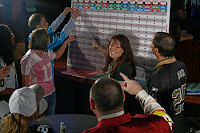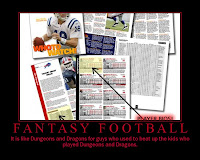... Okay, not really, but based on it's popularity, you would think so (there's even an awesome show called "The League" based on fantasy football).
So it's July, and people are already getting excited for the upcoming football season. Training camps, preseason, trades, rankings, really, it's a little insane... and personally, I wouldn't have it any other way. But this post isn't about the NFL of NCAA football seasons... well, not directly anyway...
... This post is about Fantasy Football, and by the time you finish reading this, I hope you understand the appeal and mechanics associated with this nationally popular game.
So the first thing anyone needs to know about Fantasy Football is this: YOU DON'T HAVE TO KNOW FOOTBALL TO PLAY/APPRECIATE THE GAME!... I know you don't believe me, but here's the truth. Fantasy Football is a game based on statistics, trends, and analysis, not on physicality or cunning. Let's face it, this has always been the excuse for "the jocks" to play "their" version of Dungeons and Dragons. So even if you don't watch football, you can play fantasy football, you just need a little education. In fact, fantasy football can help you appreciate the game more (it has for me!.. And by the way, I've been in leagues where the person who knows nothing about the game and picks players based on "how hot they are" has won the whole thing...)
Have you ever heard the term, "Touchdown?" "Interception?" "First Down?" More than likely, you have, and more than likely you know that those terms mean "crossing the scoring plane (End Zone) with the football in a controlled manner" (touchdown), "catching a ball thrown by the opposing team" (interception), and "completing a 10 yard progression by throwing or running with a controlled football in four tries of less by the offense" (first down). There you go, you know more than you thought you did. Let's work off that. Quarterback (QB), Running back (RB), Wide Receiver (WR), Tight End (TE), Kicker (K), and Defense (DEF)... Heard those terms? Those are the positions in football that are important to most Fantasy Football leagues (you can do others, but these are the basics). Quarterback runs the offense and can throw the ball to a receiver or run the ball himself. Running backs are set behind the quarterback and usually run the ball forward. Wide Receivers usually catch the ball thrown by the QB (but can run as well). Tight ends block for a QB, RB, or WR, but can be used as a WR as well (think of this as a "hybrid" position). Of course, the kicker kicks that ball, sometimes between the goal posts to score points, and the defense is responsible to limit the opposing team's offense scoring...
... So how does all that work it's way into Fantasy football? Great question. For offensive players (QB, RB, WR, TE), through yards and scores. This can vary between leagues, but basically, player receive points for running the ball forward, throwing the ball forward, and catching the ball further than the previous location (or "line of scrimmage"). So, the more yards a player gets, the more points your team receives. Yes, it is that simple. Then, if a player has a ball controlled and passes the End Zone for a touchdown, the offensive players involved will receive additional points (i.e. if a running back crosses the plane, he gets the points, but if a WR gets into the end zone, both the WR AND QB will get points for the yards and touchdown. Same goes for a TE). As for Kickers, they receive points every time they kick a ball between the "uprights" of the "goal post" (The Fork Looking pole at the back of an end zone). Kickers kick balls after a touchdown in the deal elects to go for an extra point (1 point in football) or, if the team was not able to get into the end zone in the allotted time/attempts, they will elect for go for a field goal (three points in football). In Fantasy football, extra points are always one point, but field goals can range from three and above depending on the distant of this kick on the field.
How does the defense work? Well, kind of different, but kind of the same. It's different because they get points for when their opponent does not score. For example, a defense might start their game with 10 points, and loose three points for every touchdown the other team scores (again, rules vary per league). Defensive scoring is the same because defenses get points if they score a touchdown (also points for interceptions and recovered fumbles, which "occur when a player that has control of the football loses the football while within bounds.").
To wrap up the points section on this, note that negative points can and will happen. If a player loses a ball (fumble), he might be award negative points. Same go for a QB's interception and/or a Kicker's missed field go. League rules vary, so make sure you know the rules ahead of time!
Okay, we now know players and points, so how exactly does that all get put together to form a team to play against other teams? Another great question. First, you have to draft players. For those unfamiliar a draft, it's an event where professional sports teams "draft" or add rookie players to their team. Fantasy Football teams do the same thing except draft players currently in the NFL. Usually, draft order is assigned randomly, and this is where all the analysis comes in to draft the players more likely to score and/or accumulate yardage while not losing points with their actions. There are restrictions to how many players you can draft and at what positions. In most leagues, you'll start a QB, a few RBs, a few WR's, a flex position (which can be a RB or WR), a TE, a K, and a DEF. You will also draft "bench players", which are players that you can change out, depending on position, when your "starter" (best player) in that position is on Bye week (not playing that week), hurt, and so on. Another thought about the draft is most fantasy football leagues are won during the middle and late rounds (or turns) of the draft. You'll hear terms like "keeper league" or "Auction Draft" mentioned, but until you get more into Fantasy Football, don't worry about these terms.
So the draft is a great time to socialize and to have some fun as a group. In fact, this might be the only chance you have to get together as a group and have some fun, so draft parties are highly recommended. Lots of bars and restaurants provides deals, goodies, and discounts to participants of draft parties that schedule ahead of time... for example...
Locally in Denver:
- Tavern (all locations)- $100 for up to 12 people to drink all domestic and import beer they want for two hours (during draft). Other specials as well.
- Lodo's Bar and Grill - 30/person all you can eat wings and all you can drink Coors Light.
- Buffalo Wild Wings - Exclusive BW3 Draft Kit & $100 in free food to use on a future visit.
- Old Chicago - $6.99/person All you can eat Pizza, beer specials, and free draft kit.
- Dave & Buster's - Book your fantasy draft party at Dave & Buster's and receive a free Pro Football Weekly Fantasy Football Guide (while supplies last), free CBS Draft Kit complete with draft board, stickers, and worksheets (while supplies last), free room rental and WiFi, 10% off food and non-alcoholic beverages, and free $10 in game play per person.
- Hooters
- Twin Peaks - Miller Light drink specials and free queso and chips during the draft, plus $5 weekly incentive for the commissioner (in addition to T-shirt, mousepad, and koozie). Board and Pens also provided.
- Sherlock Pub Company (Including Baker Street Pub and Grill) - Free Draft Kit (Draft Board, Stickers, Koozies) & $100 Free food to be used during a future visit.
So, you've had your draft, you have your players, there's a league, players, and schedule. You have set up your roster with your best players for week one... is the fun over? Of course not! In fact, this is where it gets interesting. Now the one on one match ups start happening. This is where you get to run your mouth and try to talk a big game... this is a big part of fantasy football, so make sure to get your fill :) Also, you might have to adjust your line up as players excel or decline in performance, get hurt, have bye weeks, among other reasons.
Finally, note that your final roster at the end of the season will not (and should not) match what is was at the beginning of the season (player wise). As players get hurt or possibly even cut from their team, you'll need to replace them. Also, some players "breakout" during the season and must be owned and played. This is where the "waiver wire" comes in. In most pro sports, the waiver wire is a process where a player is dropped from a team and other teams are allowed to add that player to their roster, priority usually given to the team with the worse record (and if that player is not claimed in a certain amount of time, they become a "Free Agent" and can be picked up by any team). Same rule applies for fantasy football. When a player is dropped, the team with the worse head to head record can add that player. If they do not take action, the next team with the worse record can, and so on. This also applies every week after the games are played for every "available" player, to allow teams time to adjust and plan on their next move.
Yes, their are playoffs, and yes, they vary from league to league. Usually, only a top ranked number of teams make it, some with a by week or "free win" depending on their record. Some start sooner than others (and should as the last games of the season some players might "rest" as their team in already in the NFL playoffs). Some leagues have trophies for the winner, other have cash prizes (these usually come with an entrance fee), and some are just for fun. Regardless, you're always playing to be the best, now you have to do it keep playing (towards the championship). Plan accordingly!
So there you go, the course of a fantasy football season along with a crash course on the rules and requirements. There is lots of information on the interweb for the novice, including ESPN, Yahoo! and the NFL's websites. Twitter is an awesome resource for following player news, and I would straong suggest following Adam Schefter (@AdamSchefter), Matthew Berry (@MatthewBerryTMR), Jay Glazer (@JayGlazer), and John Clayton (@ClaytonESPN), among others. I also think Rotoworld is a great resource for news and rankings (like I said, all about statistics, trends, and analysis).
Best of luck this season to all of those who play! If you have any addition thoughts, questions, suggestions, or comments, leave me a comment, so the rest the world can see it!
Word!
Clint














1 comment:
Post a Comment